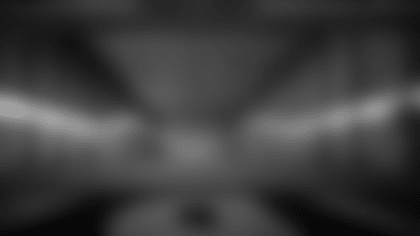Q: What changed last week? Obviously, you had a good start. Did you settle down, did you make some adjustments, what was the biggest change in the game last week?
Coach Tarver:Execution, doing our job. Eleven guys flying around, tackling the guy with the ball. When we settle in, we can be pretty good. We need to settle in sooner and we need to finish better.
Q: Obviously, with [offensive coordinator] Coach [Greg] Olson spending one year in Jacksonville, he said you guys have spoken in meetings. What kind of things do you ask about personnel?
Coach Tarver:Personnel, what they're good at. What kind of throws they like. How well quarterbacks and receivers are on the same page, who he likes to throw to and how they work together in practice. What their best throws were in practice, the way they communicated, things like that so you get to know the personnel you can't tell on the field.
Q: You talked about settling in sooner, I know during the preseason you guys were falling behind early, which isn't just a defense thing, as a defense, how do you guys get active more quickly?
Coach Tarver:Let's say this, OK? I'm on the line, across from you, and my job is to knock you back, that's what I need to do. I don't need to worry about anything else. I need to knock you back and get extension and tackle the guy with the ball – it's that simple. Don't worry about things you can't control; control what you can control. I don't know what formation they're going to start in. These guys have good football coaches, they play an up-tempo offense, and I have great respect for their head coach and offensive coordinator. I haven't worked with either one but have known them for a while and have great respect for the energy they bring and things that they do, and it's that simple. So when you get lined up and you get the call, do your job as efficiently, for however long it takes – three or four seconds – and line up and do it again. Don't make it harder than that. Don't worry about what these guys are doing over here, worry about what my job is.
Q: What did Kansas City do that made them so successful against Jacksonville last week?
Coach Tarver:Kansas City did a good job of challenging, tackling in space, using their hands in the run game, because their run game is a stretch, one-cut run game that all their runners are very good at. Then it's a power run game, so they set edges when they needed to, they did a good job of using their hands. The interior D-line did a good job of staying on their feet, because there were a lot of cut blocks that they use, and their edge DB's tackled well early in the game.
Q: You made it clear last week, 'We showed what we wanted to show in the preseason.' Against Indianapolis, the back seven, all of them blitzed at least once. Once you have something like that out there on film for other teams to see, and have seen that you will do this, how does that benefit you?
Coach Tarver:Well it does because everybody is a threat. Now when everybody's a threat, even the more simple calls, where all of a sudden somebody leans in, they start pointing because that guy came coming, that guy can be activated. That's exactly what we want to create. We bring guys from everywhere, you don't know where we're going to bring them; we do. And when we get activated, we have to win. We missed that guy a few times, sometimes when he was dead in our sights, and that's his strength. Our correction is, when you get that opportunity, make the big play. You don't want to be the guy that has a lot of missed opportunities for big plays, because you don't know when the next play is going to come. It could be play 20, it might be play one where we need to knock somebody back. It might be the biggest play of the game. I mean [Chiefs OLB] Tamba Hali didn't know he was going to get an interception for a touchdown last week, but what did he do? He rolled off, he saw a cut block, he used his hands, 'Oh there's the ball, let me catch it.' That's usually how they happen.
Q: Is that the next step for this defense, besides that, is to get those turnovers? The sack on fourth –and-one can almost be construed as a turnover.
Coach Tarver:Yeah, we count that in our own, because a fourth-down stop is a takeaway. We count that in our own defensive grade, because that's a takeaway. That's a great play by Jason [Hunter] and everybody. They were all in the right spot on that play and that was a great job. That's where we'll go. We have to be conscious about the ball. You get around the quarterback, if you get the ball out, you get the sack, but you also get the strip. So, strip to sack, that's what we say to the guys we have to do. We want the ball; there's only one of them and we want it. We're constantly emphasizing that. You guys see us at practice with our takeaway circuit and things that we do and we want to continue to get better at that. As we pull at the ball more, we'll get more of them out, like Tracy Porter's sack. He got around [Colts QB] Andrew [Luck] and he was pulling at the ball. Now it's hard to get around Andrew because he's wide, but he's pulling at the ball. That's what you ask him to do. Every time you get a chance to take a shot at the ball, take a shot at the ball.
Q: There was a game last year in Atlanta when you went on the road against a real good team and played pretty well, came up just a little bit short, but you didn't seem to be able to add on that. How do you add on it this time?
Coach Tarver: Well, every year is its own year like you hear me say, so it's not a matter of that. Coaching is, and why we do it, is to get better each week. Obviously you're excited to come home in front of the [Raider] Nation this week, we're very excited about that, to get back at home and put our black jerseys on. You have to build on it. That's your job and that's why this is great. It's a process. There's some things to build on and there's also some things that happened in that game where if we make up our minds as an individual player and as a collective unit as a defense. If we make up our minds, for those to not happen anymore, we can do that. It's when you get that, 'Oh well I did it right,' mental error. 'Oh, I'm starting to do it right,' mental error. That's what we can't have, and that's what we're pushing for, and they've been great in practice these first two days. It's 'Learn guys, let's learn, let's progress,' because otherwise, other people are progressing and what do you want to be? Do you want to be left behind?
Q: How does the change of quarterback from [Blaine] Gabbert to [Chad] Henne change your approach?
Coach Tarver:Well we saw them both last year and the offense doesn't change much when either one's in there. They both are NFL caliber, arm, movement, mindset. They're both NFL caliber starters that need more of an opportunity to become that, so really it doesn't affect us much in our game plan. There are certain things that both of them do, maybe a little bit better than others and there's enough film out there that's what we're studying.
Q: How well do you think DJ [Hayden] played? I know he gave up the three passes, but it looked like he had pretty decent coverage on all of them.
Coach Tarver:We like that DJ's challenging. He will challenge and compete and he has that ability, that short memory, that you have to have as an edge defensive back in the NFL, because you're going against the best athletes in the world, and what we love about him is that he competes and he comes back for more. He learns from every one of those situations what he can do to get better, and I'm smiling because I'm excited about what you're going to see from DJ.
Q: Will he get more snaps this week? Will his playing time increase?
Coach Tarver:Yeah, it depends on their personnel groups and formations some. But it also depends on how much we want to put those groups that he's in, on the field. We're pretty flexible in how many personnel groups we can show, the question was asked who we activate – everybody. Now we're able to do that you're able to see more of the system come out this year, and there's more. Also, it's doing your job within those groups that you're in and then that way the guys can put what they have to do in their categories. If you're a defensive end in this particular group, you do these eight things, or seven things really well, that's your job this week. That's it. Those seven, do those seven, do it. Cover the guy with the ball, we're good.
Q: In a fourth-quarter situation in close games, obviously, it comes down to one drive usually. You guys had the big drive where Indy scored, 80 yards on the drive. What mindset does the defense have to have at that point, and for a coach, how much of that do you dismiss, how much of that do you pull apart and dissect when you bring it back to your guys?
Coach Tarver:You had to say the 80 yards part, huh? A couple things there; the very thing we watched as a defense was that drive because most games in the NFL come down to that. When I say most it's probably about half, I don't know the correct stat, D.A. [Head Coach Dennis Allen] probably knows. You have to be great in those situations. That's how the great quarterbacks win games, that's how Indy made it to the playoffs last year, is that team went down the field and scored at the end of games. That's when you need to be at your best. There were some things in that drive that you don't want to learn from in that category, but once they're done, there's no better teaching than that because that is the ultimate moment. You have to perform. You have to do your job in that moment. Everybody wants to make a play but that doesn't mean they're going to let you. You have to understand how you fit in the pieces in that moment. There's three third-down conversions in that drive, and those are the three biggest plays in that game because when we do what we're supposed to do on third down, we usually at least hit him or sacked him. There are opportunities in that drive that we missed, but I'll tell you the good part about it. Every one of those guys learned from it and every one of them is excited about fixing that stuff right now. With 15 [games] left, let's go.

























